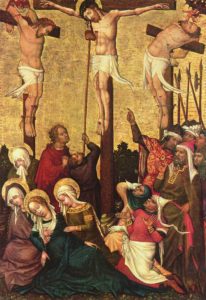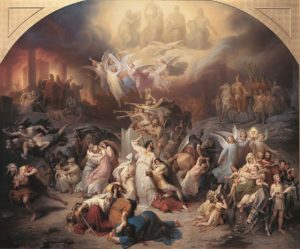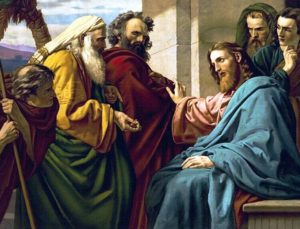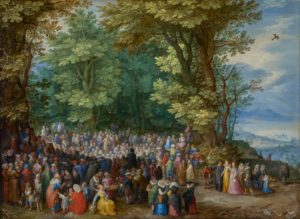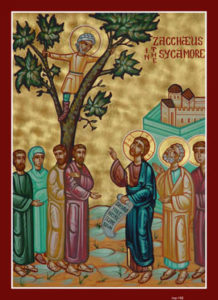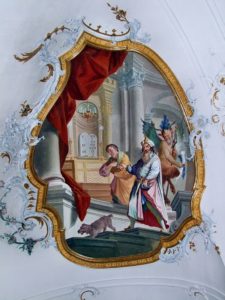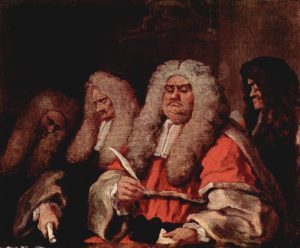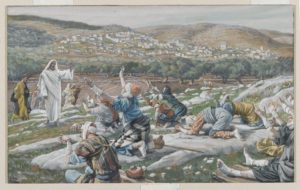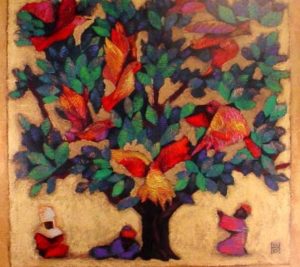Thoughts on Sunday’s Lessons for May 31, 2020
First Reading (or alternate Second Reading): Acts 2:1-21
Pentecost has arrived, and all our readings speak in some way of God’s Spirit moving in the world.
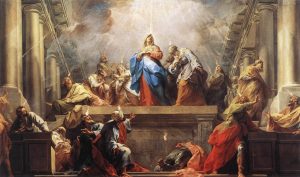
Pentecost (1732), oil painting on canvas by Jean II Restout (169201768). The Louvre, Paris. (Click image to enlarge.)
In this reading we join the apostles as they gather to celebrate Shavuot, the Jewish spring harvest festival that falls seven weeks after Passover. The resurrected Christ had told them that they would soon be “baptized in the Holy Spirit,” receiving power to be his witnesses to the ends of the earth — and now the Spirit comes in a rush of wind and tongues of fire, inspiring the Apostles to declare the Good News in many languages. Then Peter steps up and tells the crowd that, as the Prophet Joel foretold, God’s Spirit will be poured out for all.
First Reading (alternate): Numbers 11:24-30
Seven weeks after Easter we celebrate Pentecost, the third major church holiday of the year. On Christmas we remembered the birth of Jesus. On Easter we recall Jesus’ death and resurrection. Pentecost completes the circle with God’s gift of the Holy Spirit, inspiring us to take the Gospel out to the world in Jesus’ name. This alternative first reading tells how God’s spirit empowered 70 of his elders. The spirit even came to two elders who weren’t present, an event that perturbed Joshua until Moses reassured him. Wherever God’s spirit moves through us, good things can happen.
Psalm: Psalm 104:25-35
This hymn of praise exults in all the works of God’s creation, including the charming idea that God may have made some creations, like Leviathan, the giant whale, “for the sport of it,” just for fun. Not only do we thank God for making the earth, its seas, and creatures both small and great, but also for nurturing them, ensuring that they are fed, and offering them protection. God’s Spirit goes out to continue creation and renew the earth, just as she breathed over the face of the waters on the day of creation.
Second Reading: 1 Corinthians 12:3b-13
Paul’s beautiful first letter to the people of Corinth clearly spells out his theology of the Holy Spiri: Through the Spirit we all are all made one in baptism. Nationality, economic status, gender, slave or free, none of these things matter. Just as the body is made up of different parts that serve different functions, all of us bring our own special gifts as we work together, guided by the Spirit, for the good of all. We are all moved by the Spirit, each according to our own gifts, but all in one as members of the body of Christ.
Gospel: John 20:19-23
Think about what it must have been like for the disciples on the first Easter day. Grieving the crucifixion and death of their leader, Jesus, they surely felt both wild hope and fearful uncertainty when Mary Magdalene came running in shouting “I have seen the Lord!” She told them that the tomb was empty and she had met a man in white there. But how? Why? What does it all mean? They stay in the locked room as darkness falls, and suddenly Jesus is among them. He wishes them peace, shows them his wounds. Then he breathes on them, empowering them with the Holy Spirit who will take them out into the world.
Gospel (alternate): John 7:37-39
Pentecost is one of the feast days designated as especially appropriate for baptism. In fact, one of its traditional English names, “Whitsunday,” or “White Sunday,” refers to the white garments that those being baptized wore in ancient times. Whenever we welcome new members into Christ’s Body in the church, the celebrant blesses the water in the font, reminding us that “In it we are buried with Christ in his death. By it we share in his resurrection, and through it we are reborn by the Holy Spirit.” In this short alternative gospel, Jesus tells how rivers of living water will flow from the hearts of those who believe. Through the living water of baptism our hearts join in pouring out the good news of the Gospel.

